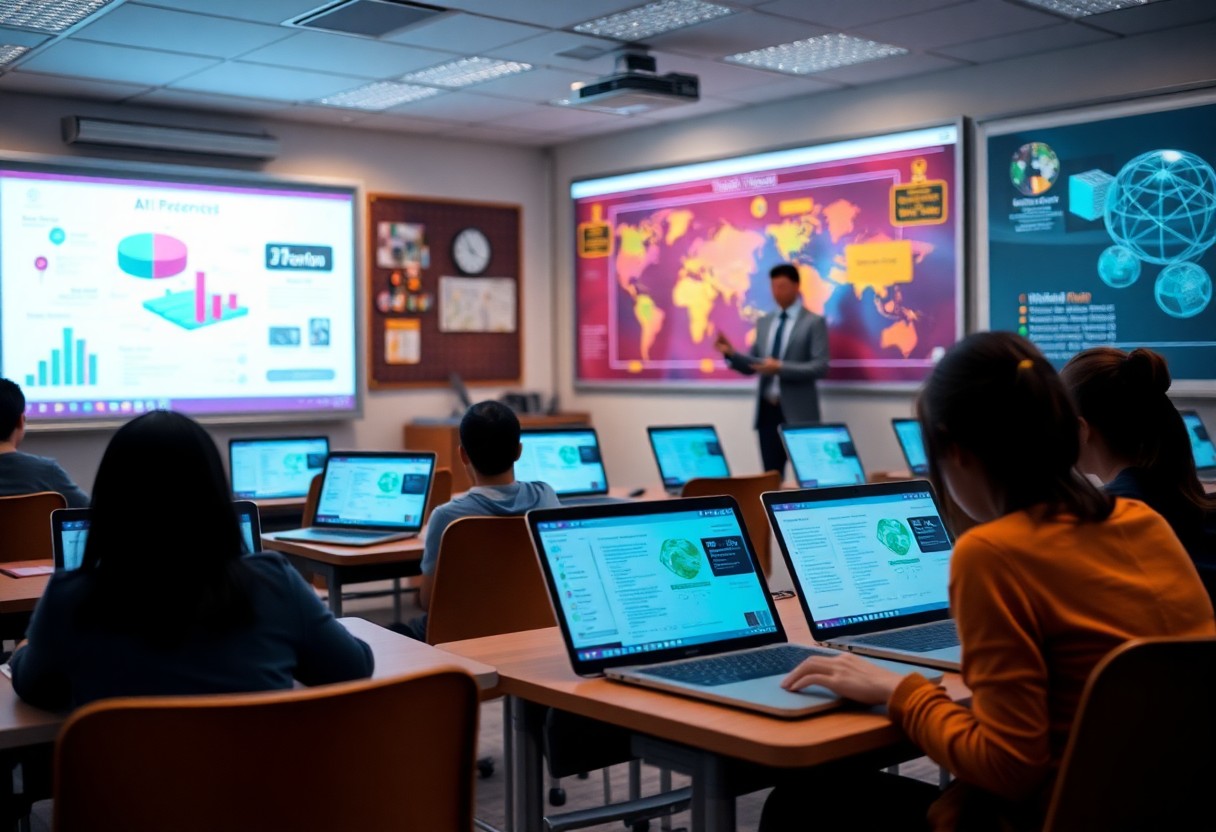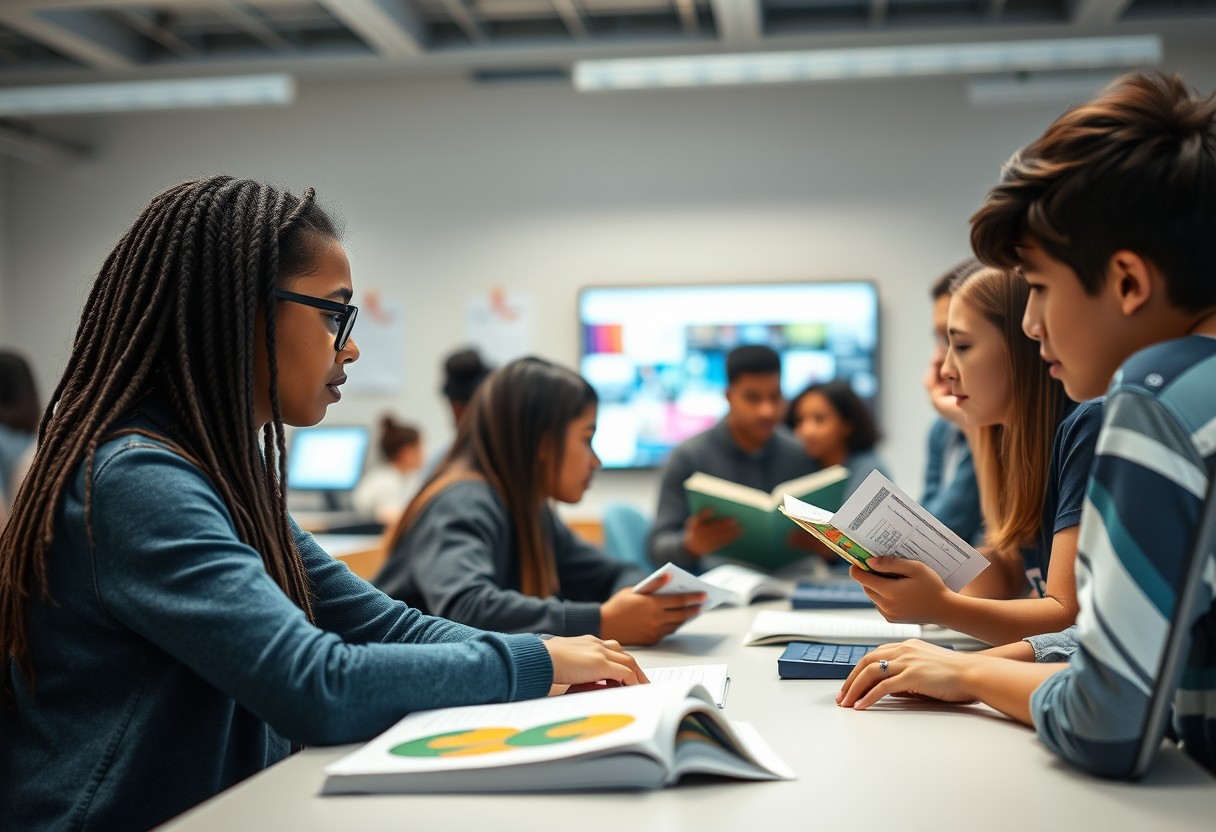Just imagine a world where artificial intelligence revolutionizes the way we learn. By incorporating AI into education, students can receive personalized learning experiences tailored to their unique needs and learning styles. This innovative technology has the potential to transform education by providing real-time feedback, adapting curriculum in real-time, and enhancing student engagement. Let’s examine into how AI is reshaping the future of education through personalized learning experiences.
The Current State of Personalized Learning
For many years, traditional teaching methods have dominated the education system. These methods often involve a one-size-fits-all approach, where the same material is taught to all students at the same pace. Unfortunately, this approach can leave many students behind, as each individual has unique learning needs and abilities. Limitations of Traditional Teaching Methods
Teaching in a way that caters to the individual needs of each student is imperative for a truly effective education system. The Need for Innovation in Education
Current educational practices may not be able to fully satisfy the diverse needs of students, leading to achievement gaps and disengagement. The incorporation of Artificial Intelligence (AI) in education has the potential to revolutionize personalized learning experiences, providing individualized learning paths and real-time feedback to students.
What is Artificial Intelligence in Education?
Defining AI and Its Applications
Education has been revolutionized by the integration of Artificial Intelligence (AI) technologies. AI refers to the simulation of human intelligence processes by machines, including learning, reasoning, and self-correction. In the context of education, AI technologies encompass a wide range of applications, such as adaptive learning systems, intelligent tutoring systems, and personalized learning platforms.
How AI Can Enhance Educational Outcomes
Education today stands to benefit immensely from the capabilities of AI. By leveraging AI technologies, educators can tailor learning experiences to the individual needs and preferences of students. AI can analyze vast amounts of data to identify patterns and trends in student performance, allowing for real-time adjustments to teaching strategies.
This level of personalization in education can lead to improved student engagement, enhanced knowledge retention, and overall better academic outcomes. AI can help create a dynamic learning environment where every student can thrive and reach their full potential.

The Role of AI in Personalized Learning
There’s a significant role that Artificial Intelligence (AI) plays in enhancing personalized learning experiences in education. AI technologies have the potential to revolutionize the way students learn by providing tailored learning experiences that cater to each individual’s needs and preferences.
Adaptive Assessments and Learning Paths
With AI, adaptive assessments can be created to gauge a student’s understanding of a particular topic in real-time. Based on the assessment results, AI algorithms can then generate personalized learning paths for students, focusing on areas where they need improvement and advancing them faster through topics they have already mastered. This level of personalized learning helps students stay engaged and motivated, ultimately leading to better learning outcomes.
Real-time Feedback and Progress Tracking
Adaptive real-time feedback and progress tracking are necessary components of personalized learning powered by AI. This technology allows educators to monitor student progress instantly and provide immediate feedback to guide their learning journey effectively. AI algorithms can analyze data from various sources to identify patterns in a student’s learning behavior, allowing for tailored interventions to address any challenges or obstacles they may be facing.
This real-time feedback mechanism enables educators to make data-driven decisions to optimize the learning experience for each student, ensuring that they are receiving the support they need to succeed.
AI-Powered Learning Analytics
Data-Driven Insights for Teachers and Students
Students today are benefiting greatly from AI-powered learning analytics, which provide data-driven insights for both teachers and students. Teachers can utilize AI technology to track student progress, identify areas of improvement, and tailor their teaching methods accordingly. For students, personalized feedback and recommendations help them understand their learning patterns and adjust their study habits for better academic performance.
Identifying Knowledge Gaps and Learning Styles
To further enhance personalized learning experiences, AI algorithms can analyze vast amounts of data to identify knowledge gaps and individual learning styles. By understanding where students are struggling and how they learn best, educators can offer targeted support and resources. This tailored approach ensures that each student gets the assistance they need to succeed.
AIPowered learning analytics revolutionize the way education is delivered by empowering educators with real-time insights into student progress and learning behaviors. By detecting patterns and trends in student data, AI can predict future performance and provide personalized recommendations to bridge any knowledge gaps. This proactive approach not only enhances the learning experience but also fosters a more efficient and effective educational environment.
Intelligent Tutoring Systems
Not only do Intelligent Tutoring Systems (ITS) have the capability to revolutionize personalized learning experiences, but they also offer a wide range of benefits in educational settings. These systems use artificial intelligence algorithms to provide personalized learning experiences to students, offering adaptive feedback and guidance tailored to individual needs.
One-on-One Support for Students
Students benefit greatly from the one-on-one support that Intelligent Tutoring Systems offer. These systems can adapt to the student’s learning pace, providing personalized feedback and guidance in real-time. Whether a student is struggling with a concept or ready to advance to the next level, ITS can cater to their specific needs, fostering a more efficient and productive learning environment.
Humanizing AI-Mediated Learning Experiences
Tutoring
For instance, incorporating elements of empathy and understanding into AI-mediated learning experiences can create a more engaging and personalized environment for students. By simulating a human tutor’s qualities of patience and encouragement, these systems can enhance the overall learning experience and motivation for students.
Natural Language Processing in Education
After being integrated into educational technology, Natural Language Processing (NLP) has the potential to revolutionize personalized learning experiences. NLP enables computers to understand, interpret, and generate human language, opening up a myriad of possibilities for enhancing education.
Enhancing Reading Comprehension and Writing Skills
Language is at the core of education, and NLP can significantly improve students’ reading comprehension and writing skills. By analyzing texts and providing personalized feedback, NLP tools can help students better understand complex concepts, improve their vocabulary, and enhance their writing proficiency. Additionally, NLP can assist educators in identifying specific areas where students may be struggling, allowing for targeted interventions to support their learning.
AI-Assisted Language Learning and Literacy
Enhancing language learning and literacy through AI can positively impact students of all ages and proficiency levels. AI-powered language learning platforms can adapt to individual learning styles, create personalized learning paths, and offer real-time feedback to enhance language acquisition. By leveraging NLP capabilities, these tools can improve pronunciation, grammar, and vocabulary, ultimately helping students become more confident and proficient in their language skills.
Plus, with AI-assisted language learning, students have the flexibility to practice and improve their language skills anytime and anywhere, promoting continuous learning and skill development outside the traditional classroom setting.
AI-Driven Gamification and Engagement
Making Learning Fun and Interactive
Your personalized learning experience can be revolutionized with AI-driven gamification. By incorporating game elements such as challenges, rewards, and competition, AI can make learning more engaging and enjoyable. With features like progress tracking, personalized feedback, and interactive simulations, students can immerse themselves in a digital learning environment that feels more like play than work.
Boosting Student Motivation and Participation
Interactive AI-driven tools can significantly boost student motivation and participation. By offering real-time feedback, personalized recommendations, and adaptive challenges, AI can cater to individual learning styles and pace, keeping students actively engaged. These tools can also foster a sense of accomplishment and mastery, motivating students to challenge themselves and strive for continuous improvement.
Understanding that each student has unique strengths and weaknesses, AI can tailor learning experiences to address individual needs, ensuring that no student is left behind or feels overwhelmed. As students experience success and improve their skills, their confidence and motivation are likely to increase, leading to a more positive and productive learning environment.
Virtual Learning Environments and AI
Once again, Artificial Intelligence is revolutionizing the way we approach personalized learning experiences through Virtual Learning Environments. These environments leverage AI algorithms to tailor educational content to the specific needs and learning styles of individual students, making the learning process more efficient and engaging.
Immersive Learning Experiences and Simulations
One exciting application of AI in virtual learning environments is the creation of immersive learning experiences and simulations. These tools allow students to actively engage with course material in a realistic and interactive way, enhancing their understanding and retention of complex concepts. By using AI to adapt the simulations based on student responses, educators can provide personalized feedback and support, significantly improving the learning outcomes.
Expanding Access to Quality Education
Simulations powered by AI have the potential to democratize access to quality education by breaking down barriers to learning. Through virtual environments, students from different geographical locations or socioeconomic backgrounds can access high-quality educational resources and experiences. This transformative technology has the power to level the playing field and ensure that all individuals have the opportunity to receive a top-notch education, regardless of their circumstances.
Access to quality education is no longer limited by physical proximity to educational institutions or financial constraints, thanks to the innovative use of AI in virtual learning environments. By expanding access to personalized and engaging learning experiences, AI is paving the way for a more inclusive and equitable education system.
AI-Assisted Teacher Professional Development
Enhancing Teaching Practices and Pedagogy
To enhance teaching practices and pedagogy, artificial intelligence offers personalized feedback and suggestions to educators. AI can analyze classroom data, including student performance and engagement levels, to provide teachers with insights on how to tailor their instruction to meet individual student needs. Through AI-assisted professional development, teachers can refine their teaching strategies, identify areas for improvement, and ultimately create a more engaging and effective learning environment for their students.
Supporting Teachers in the AI-Driven Classroom
On supporting teachers in the AI-driven classroom, artificial intelligence tools can streamline administrative tasks, such as grading assignments and organizing curriculum materials, allowing educators to allocate more time to focus on student learning and engagement. Additionally, AI can offer real-time support during lessons by providing teachers with instant feedback on student understanding, enabling them to make timely interventions and adjustments to their teaching methods.
For instance, AI-powered tools like chatbots can assist teachers in answering student questions outside of classroom hours, providing immediate support and enabling a more personalized learning experience for students. This not only lightens the load for teachers but also fosters a collaborative and interactive learning environment where students can receive individualized help when needed.
Ensuring Equity and Inclusivity in AI-Enhanced Education
Now, as artificial intelligence (AI) becomes more prevalent in education, it is crucial to address issues of bias and fairness in AI systems to ensure equitable learning opportunities for all students. Any AI system is only as unbiased as the data it is trained on, which means that if the data used to train the AI models are biased, the outcomes produced by those systems can perpetuate inequalities. It is crucial for developers and educators to actively work towards identifying and mitigating bias in AI algorithms to prevent reinforcing existing disparities based on race, gender, or socioeconomic status.
Addressing Bias and Fairness in AI Systems
Promoting Accessibility and Inclusive Learning
Promoting access and inclusivity in AI-enhanced education involves ensuring that the technology is usable by all students, including those with disabilities. This can be achieved by developing AI tools and platforms that are compatible with assistive technologies, providing multiple modalities for content delivery, and offering personalized learning pathways to accommodate diverse learning styles and needs.
Promoting Accessibility and Inclusive Learning
Fairness in AI-enhanced education means that all students, regardless of their backgrounds or abilities, have equal access to high-quality learning experiences. By actively promoting inclusivity and accessibility in AI systems, educators can create a more equitable learning environment where every student has the opportunity to thrive and reach their full potential.
Overcoming Implementation Challenges
Despite the numerous benefits that artificial intelligence can bring to personalized learning experiences, there are several challenges that need to be addressed for successful implementation in education.
Technical and Infrastructure Requirements
With the integration of artificial intelligence in personalized learning, educational institutions must ensure they have the necessary technical capabilities and infrastructure in place. This includes robust data systems, high-speed internet connectivity, and secure platforms for implementing AI-powered tools effectively.
Change Management and Teacher Buy-In
The success of AI-enhanced personalized learning heavily relies on effective change management strategies and securing teacher buy-in. The integration of new technologies can be met with resistance and skepticism, making it crucial for education leaders to involve teachers in the planning process and provide adequate training and support.
For instance, empowering teachers to understand the benefits of AI in enhancing personalized learning experiences and involving them in decision-making processes can foster a sense of ownership and collaboration, leading to smoother implementation.
The Future of AI in Education
Emerging Trends and Innovations
Many cutting-edge technologies are shaping the future of AI in education. From adaptive learning platforms that tailor learning experiences to individual students’ needs to smart content that adjusts based on the user’s interactions, the possibilities are endless. AI algorithms are becoming increasingly sophisticated, enabling educators to gain deeper insights into students’ learning patterns and preferences, thereby enhancing the personalization of educational content.
Preparing Students for an AI-Driven World
To prepare students for an AI-driven world, educators must incorporate AI technologies into the curriculum. By teaching students how to interact with AI systems, analyze data, and solve problems using AI tools, educators can ensure that the next generation is equipped with the skills needed to thrive in a technologically advanced society.
Emerging technologies such as AI are revolutionizing the landscape of education, offering new ways to engage students and optimize learning outcomes. By integrating AI into educational practices, schools can empower students to develop critical thinking skills, adapt to technological changes, and become lifelong learners in an ever-evolving digital world.
Addressing Concerns and Ethical Considerations
Job Displacement and the Role of Humans in Education
Now, addressing concerns about the integration of artificial intelligence in education involves considering the potential displacement of human roles. While AI can automate certain tasks and provide personalized learning experiences, there are worries about the loss of jobs for educators. However, it’s imperative to acknowledge that AI in education can enhance, not replace, human teachers. The role of educators may shift towards more personalized mentoring, emotional support, and guidance, while AI handles administrative tasks and provides data-driven insights.
Data Privacy and Security in AI-Enhanced Learning
An important ethical consideration in AI-enhanced personalized learning is data privacy and security. AI algorithms rely on vast amounts of student data to customize learning experiences, raising concerns about how this data is collected, stored, and protected against breaches. Ensuring strict protocols and encryption methods are in place is crucial to safeguarding sensitive information and maintaining trust between learners, educators, and AI systems.
To address these concerns, institutions must prioritize transparency in how student data is used and establish clear guidelines for data security. Regular audits and updates to AI systems can help prevent potential vulnerabilities and ensure compliance with privacy regulations.
To wrap up
Drawing together the threads of artificial intelligence and personalized learning, it is evident that AI holds immense potential to revolutionize the traditional classroom experience. By harnessing the power of AI technologies, educators can cater to individual learning styles and pace, creating a more engaging and effective learning environment for students. The ability of AI to analyze vast amounts of data and provide personalized feedback can significantly enhance the quality of education and help students reach their full potential.
As we continue to explore the intersection of AI and education, it is crucial to embrace these technological advancements with a critical eye and a focus on ethical considerations. While AI can undoubtedly enhance personalized learning experiences, it is necessary to strike a balance between technology and human interaction in the educational realm. By adopting a thoughtful and strategic approach, we can leverage AI to create a more personalized, inclusive, and effective learning experience for students around the world.
FAQ
Q: What is personalized learning in education?
A: Personalized learning in education refers to tailoring instruction to meet the individual needs and preferences of each student.
Q: How can artificial intelligence enhance personalized learning experiences in education?
A: Artificial intelligence can enhance personalized learning experiences by analyzing student data to create adaptive learning paths, providing real-time feedback, and offering customized educational content.
Q: What role does artificial intelligence play in adaptive learning?
A: Artificial intelligence plays a crucial role in adaptive learning by continually assessing student performance and adjusting the learning experience to suit their needs and pace.
Q: How does artificial intelligence improve student engagement in personalized learning?
A: Artificial intelligence can improve student engagement by creating interactive and dynamic learning experiences that cater to the student’s interests and learning preferences.
Q: Can artificial intelligence help identify learning gaps in students?
A: Yes, artificial intelligence can analyze student performance data to identify learning gaps and provide targeted interventions to help students overcome difficulties.
Q: Are there any potential challenges associated with using artificial intelligence in personalized learning?
A: Some potential challenges of using artificial intelligence in personalized learning include concerns about data privacy, the need for ongoing teacher training, and the risk of over-reliance on technology.
Q: How can educators successfully integrate artificial intelligence into personalized learning environments?
A: Educators can successfully integrate artificial intelligence into personalized learning environments by fostering a culture of experimentation and collaboration, providing training and support for teachers, and ensuring ethical and responsible use of AI technologies.




